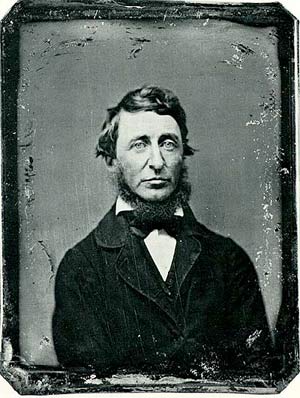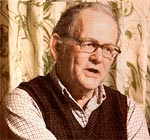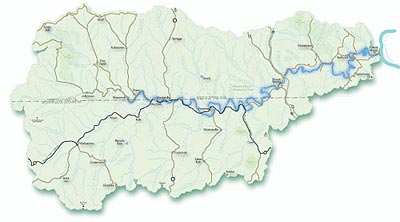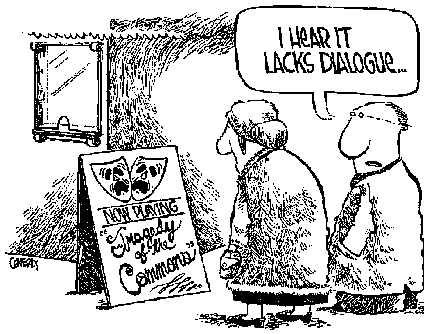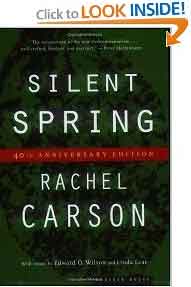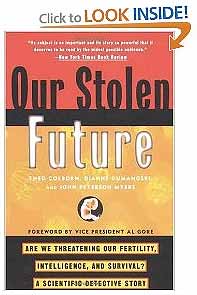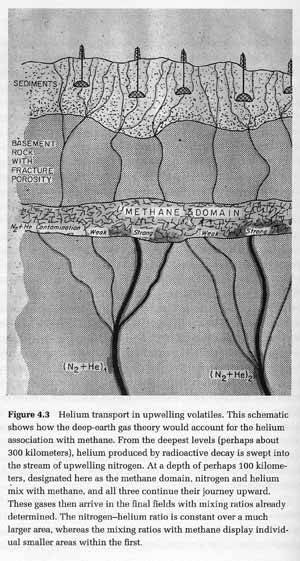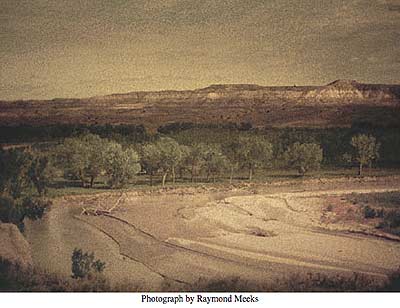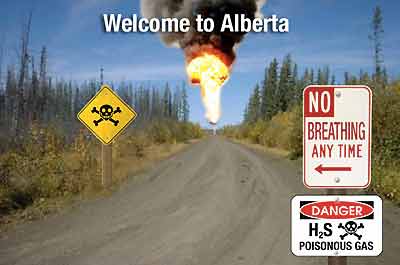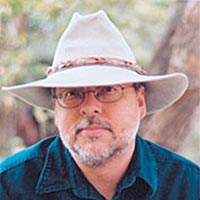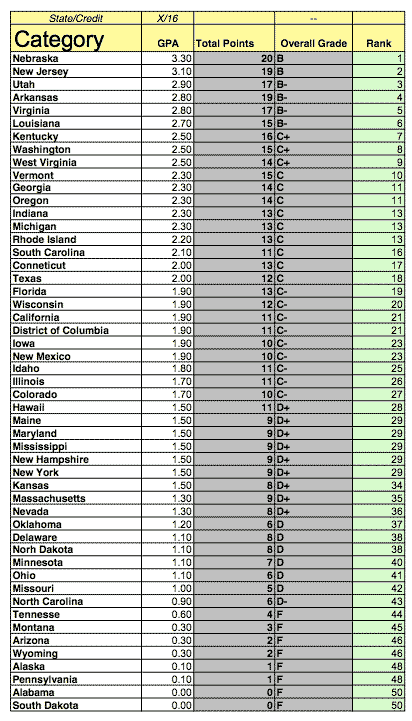Biblio
A Project in Cooperation with the Thoreau Society.
The Thoreau Reader - Annotated works of Henry David Thoreau
While Walden can be applied to almost anyone's life, "Civil Disobedience" is like a venerated architectural landmark: it is preserved and admired, and sometimes visited, but for most of us there are not many occasions when it can actually be used.
Still, although seldom mentioned without references to Gandhi or King, "Civil Disobedience" has more history than many suspect.
In the 1940's it was read by the Danish resistance, in the 1950's it was cherished by those who opposed McCarthyism, in the 1960's it was influential in the struggle against South African apartheid, and in the 1970's it was discovered by a new generation of anti-war activists. The lesson learned from all this experience is that Thoreau's ideas really do work, just as he imagined they would.
See: The Higher Law: Thoreau on Civil Disobedience and Reform by Henry David Thoreau, edited by Wendell Glick, with an introduction by Howard Zinn.
As a result of his writings and personal witness, we are the heirs of a legacy of creative protest. - Martin Luther King, Jr, Autobiography
This work is included in Fracking Resource Guide as an homage to the many individual voices and blogs I will continue to read that help the world stay informed about the dangers of hydrofracking.
I will join you at the barricades. Drilling isn't safe.
See: Essay by Peter Suber. "Civil Disobedience".
...The Nuremberg principles require disobedience to national laws or orders which violate international law, an overriding duty even in (perhaps especially in) a democracy.
See: Criticism: Tragedy of the commons | Wikipedia
More significantly, criticism has been fueled by the "application" of Hardin's ideas to current policy issues. In particular, some authorities have read Hardin's work as specifically advocating the privatization of commonly owned resources.
Consequently, resources that have traditionally been managed communally by local organizations have been enclosed or privatized. Ostensibly, this serves to "protect" such resources, but it ignores the pre-existing management, often appropriating resources and alienating indigenous (and frequently poor) populations. In effect, private or state use may result in worse outcomes than the previous management of commons.
Ostrom, E., J. Burger, C. B Field, R. B Norgaard, and D. Policansky. 1999. Revisiting the commons: local lessons, global challenges. Science 284, no. 5412: 278.
Victor L. Ponce. Hardin's "Tragedy of the Commons" Revisited or We Are All In the Same Boat.
Another example of a typical commons is groundwater. Nobody really owns the groundwater; it is technically up for grabs. However, individual pumping of too much groundwater can result in the depletion of the resource, to say nothing of other related effects or losses, such as land subsidence and salt-water intrusion...Eventually, depletion by a few means depletion for all.
See: USGS. Land Subsidence
Victor Ponce is a Professor of Civil, Construction and Environmental Engineering at San Diego State University.
See: Marcellus-Shale.us. December 2, 2009. "Dunkard Creek Fish Kill."
The Tragedy of the Commons
Adding together the component partial utilities, the rational herdsman concludes that the only sensible course for him to pursue is to add another animal to his herd. And another... But this is the conclusion reached by each and every rational herdsman sharing a commons.
Therein is the tragedy. Each man is locked into a system that compels him to increase his herd without limit -- in a world that is limited. Ruin is the destination toward which all men rush, each pursuing his own best interest in a society that believes in the freedom of the commons. Freedom in a commons brings ruin to all.
I would like to focus your attention not on the subject of the article (national security in a nuclear world) but on the kind of conclusion they reached, namely that there is no technical solution to the problem.
An implicit and almost universal assumption of discussions published in professional and semipopular scientific journals is that the problem under discussion has a technical solution. A technical solution may be defined as one that requires a change only in the techniques of the natural sciences, demanding little or nothing in the way of change in human values or ideas of morality...
...It is our considered professional judgment that this dilemma has no technical solution.
See: J. B. Wiesner and H. F. York. "National Security and the Nuclear-Test Ban." Sci. Amer. 211 (No. 4), 27 (1964).
See: The Tragedy of the Commons. Food and Agriculture Organization of the United Nations (FAO) in:
Jean-Marie Baland and Jean-Phillipe Plateau. (1996). "Halting degradation of natural resources". Food and Agriculture Organization of the United Nations. Rome, Italy.
Is there a Role for Rural Communities?
The present work is concerned with the topical issue of natural resource management. It does not deal, however, with broad-spectrum environmental concerns such as protection of wilderness areas (for example, the south pole), air or water pollution, etc., but focuses on local ecosystems. What distinguishes local-level resources from larger ecosystems is that:
(1) they are susceptible of appropriation by relatively small units (including individuals) and
(2) they can lead to rivalry in consumption in so far as yields of these resources are clearly perceived as subtractable. This book thus addresses the question as to how these local or village-level natural resources (as contrasted with global commons) can be most efficiently and equitably managed. In other words, can we find guidelines or sound theoretical principles for an optimal long-term exploitation of local resources (forests, irrigation water, pastures, lakes and rivers, sea areas, etc.)?
Disturbing evidence highlighting rapid processes of resource depletion, particularly so in developing countries, has stimulated a lot of theoretical and empirical works during the last decades. Moreover, relevant theoretical tools (such as game theory) have been developed independently of environmental concerns which have potential applications to this field.
The official birthday of EPA is December 2, 1970. Like any other birth, EPA's needed progenitors, and a family tree stretching back for years. Surely no factor was more pivotal in the birth of EPA than decades of rampant and highly visible pollution. But pollution alone does not an agency make. Ideas are needed--better yet a whole world view--and many environmental ideas first crystallized in 1962.
That year saw the publication of Rachel Carson's Silent Spring, first in serial form in the New Yorker and then as a Houghton Mifflin best seller. This exhaustively researched, carefully reasoned, and beautifully written attack on the indiscriminate use of pesticides was not exactly light reading. Yet it attracted immediate attention and wound up causing a revolution in public opinion.
An inveterate bird-watcher, Carson derived her missionary zeal from her fear that fewer species of birds would be singing each spring unless pesticide poisoning was curtailed. The readers of her book, however, were less alarmed by the prospect of a "Silent Spring" than they were about people dying from any number of hidden poisons lurking in what had previously seemed a benign environment. It was not hard to wax hysterical after reading in Carson's book that "the common salad bowl may easily present a combination of organic phosphate insecticides" that could "interact" with lethal consequences to the unsuspecting salad muncher.
Silent Spring played in the history of environmentalism roughly the same role that Uncle Tom's Cabin played in the abolitionist movement. In fact, EPA today may be said without exaggeration to be the extended shadow of Rachel Carson. The influence of her book has brought together over 14,000 scientists, lawyers, managers, and other employees across the country to fight the good fight for "environmental protection..."
See: EPA History Web Page
See: The Origins of EPA
See: Carson, Rachel. (1962). Silent Spring. Boston: Houghton Mifflin, 2002. Print.
A dissection of the Soviet Union's legacy of health and environmental disaster, this book examines a former country of 103 cities - home to 70 million people - where the air is unfit to breathe and pollution fouls 75 percent of the water.
Feshbach, Murray, and Alfred Friendly. 1992. Ecocide in the USSR: health and nature under siege. New York, NY: BasicBooks. Includes section (p.256) "The Prices of Cleanup".
A broad exposé of how chemicals disrupt the endocrine systems of living organisms.
See: Chapter 12, p.210 - "Defending Ourselves" offering advice on how we can avoid the disruptions caused by these chemicals.
See: TEDX | The Endocrine Disruption Exchange | Chemicals in Natural Gas Operations
TEDX: Chemicals in Natural Gas Operations | What You Need to Know About Natural Gas Production (Video)
TEDX: The Fossil Fuel Connection (PDF)
Natural Gas Operations from a Public Health Perspective (PDF)
by Theo Colborn, Carol Kwiatkowski, Kim Schultz, Mary Bachran. In Press, International Journal of Human and Ecological Risk Assessment, Sept 2010
Thomas Gold (1920-2004), Cornell astronomer and brilliant scientific gadfly.
The Abiogenic Theory of Petroleum Formation
Editor's Note: If we bust the myths about global warming and fossil fuels - the growing scarcity of our oil supply, and can replant lots of trees, by Freeman Dyson's estimates, a trillion, to remove all the carbon dioxide from the atmosphere now, with a lot more needed by 2050, as India, China, Brazil, etc. industrialize; then we only have to worry about methane from gas flares, and the melting of the tundra permafrost to prevent humanity from reaching the "tipping-point" of our destruction.
The Earth will undoubtedly survive, but we won't. Global Warming must be addressed by all governments, NGO's, citizen activists, and corporations. Drilling Isn't Safe. (Neil Zusman, 2010-11-14.)
Deep within the earth's crust there exists a second biosphere, composed of very primitive heat-loving bacteria and containing perhaps more living matter than is present on the earth's surface...
...Gold joins the deep hot biosphere argument to another, perhaps even more controversial theory for which he has marshalled evidence: that so-called fossil fuels originate not from compressed biological matter at all but from deep within the earth, present there since the planet's formation, long before our oxygen-rich surface biosphere came into existence.
The pattern of petroleum deposits and the mix of elements associated with them around the world, the dramatic results of a Swedish drilling project (1990) in non-sedimentary rock, and indications that some petroleum reserves are refilling - this is some of the evidence that supports Gold's thesis and cannot be adequately accounted for by conventional theories.
The implications of Gold's views are no less far-reaching than the theories behind them. The deep hot biosphere and deep-earth gas theories shed light on the nature of earthquakes, they suggest that reservoirs of petroleum and certain metal ores are much vaster (though not necessarily more accessible) than generally claimed, and they help to answer two of the most profound mysteries of the biological sciences: the origins of life on earth and the prospects of extraterrestrial life.
Did life develop from the deep hot biosphere? Are Mars and other planets as lifeless as they seem, or might they too be found to contain deep hot biospheres, if only scientists would look below the surface. --from the book jacket, 1999 edition.
Chapter 4. Evidence for Deep-Earth Gas
Chapter 5. Resolving the Petroleum Paradox
Chapter 6. The Siljan Experiment
Schematic image showing how the deep-earth gas theory would account for the helium association with methane (p. 76). Perhaps drilling deeper would make hydraulic fracturing and mountain-top removal unnecessary.
Gold's book has a Foreword by Freeman Dyson who is among the signatories of a letter to the UN criticizing the IPCC. He has argued against the ostracization of scientists whose views depart from the acknowledged mainstream of scientific opinion on climate change, stating that "heretics" have historically been an important force in driving scientific progress."
Heretics who question the dogmas are needed... I am proud to be a heretic. The world always needs heretics to challenge the prevailing orthodoxies."
See: Nicholas Davidoff. NYT. 2009. "The Civil Heretic".
See: Freeman Dyson. Heretical Thoughts About Science and Society. Edge | The Third Culture. Aug. 8, 2007.
See: Kellesidis, V.C. (2009). Challenges for very deep oil and gas drilling-will there ever be a depth limit? Athens, Greece: 3rd AMIREG International Conference (2009): Assessing the Footprint of Resource Utilization and Hazardous Waste Management.
Of course, we find oil ‘where it is’, where it has remained for ages, but how was it formed? Current belief is that oil is of biotic origin, through accumulation of organic matter (plankton, single cell organisms that floated on ocean surface) and sedimentation followed by burial. For large periods organic material has been under very high pressures and temperatures, in the range of 130-150 degrees C, in a ‘cooking pot’ and gradually transformed to petroleum.
Because of its lower density, it has migrated upwards and some surfaced and was lost, while some has hit non-permeable layers (the seal) and accumulated in the porous sedimentary rocks creating the world’s oil and gas fields.
There is, however, another school of thought, not very well known until recent years, which is gaining, though, momentum. It is the theory of abiotic (or abiogenic) origin of petroleum, that hydrocarbons have been formed in the depths of earth by reduction of CO2 and H2 gases in the presence of metal catalysts (Gold and Soter, 1980; Kenney, 1994; Krayushkin et al., 1994; Glasby, 2006; Wikipedia, 2009).
The consequences of course of such a theory, if true, could be extraordinary, as earth’s mantle becomes the inexhaustible provider of the cheapest energy source on earth...
Alexandrovich Kudryavtsev (Kudryavtsev, 1951) was the first to start the theory of abiotic generation of hydrocarbons, in what has become the modern Russian-Ukrainian theory of abyssal, abiotic petroleum (Kropotkin, 1986; Kenney et al., 2002). However, Abbas (1996) starts the history as early as 1877 by Mendeleev and provides a good overview as well as pros and cons about the two points of view.
See: Jet Propulsion Laboratory, California Institute of Technology. Beautiful Ontario Lacus: Cassini’s Guided Tour.
Ontario Lacus, the largest lake in the southern hemisphere of Saturn’s moon Titan, turns out to be a perfect exotic vacation spot, provided you can handle the frosty, subzero temperatures and enjoy soaking in liquid hydrocarbon.
See these articles:
Bluemle, J., and L. Manz. 2004. The Origin of Oil. North Dakota Department of Mineral Resources: North Dakota Feological Survey. NDGS Newsletter. 31: 1. Summer 2004.
Glasby, G. P. 2006. Abiogenic origin of hydrocarbons: An historical overview. Resource Geology 56, no. 1: 83–96.
Gold, Thomas. 1982. Abiogenic methane and the origin of petroleum. Energy Exploration & Exploitation 1, no. 2: 89–104.
———. 1992. The deep, hot biosphere. Proceedings of the National Academy of Sciences of the United States of America 89, no. 13: 6045.
———. 1993. The Origin of Methane (and Oil) in the Crust of the Earth. USGS Professional Paper 1570.
U.S. Department of the Interior | U.S. Geological Survey (USGS). 1998. OFR 98-468 World Conventional Crude Oil and Natural Gas. U.S. Geological Survey (USGS).
Pedro Ramirez, Jr. "Wildlife Mortality Risk in Oil Field Waste Pits." U.S. Fish and Wildlife Service. Environmental Contaminants Specialist.
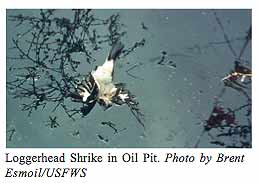
The risk that oil pits pose to wildlife has been documented by several studies. Hydrofracking involves the storage of "frack water" in open pits.
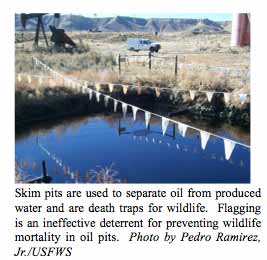
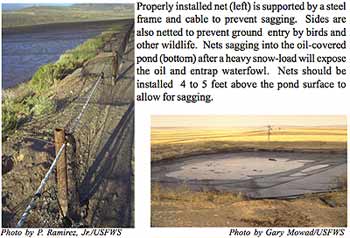
See: TxSharon (2009). Video. "Cattle Drink Drilling Waste."
See: Robert Myers (2010). Environmental Dangers of Hydro-Fracturing.
See: Laura Legere (2010). Hazards posed by natural gas drilling are not limited to below ground.
See: Pit Pollution.
See: Powder River Basin Resource Council
See: Rancho Los Malulos | A satirical view from the McGill Brothers Lease
See: Ecological integrity of streams related to human cancer mortality rates
During last year's presidential campaign, Richard B. Cheney acknowledged that the oil-field supply corporation he headed, Halliburton Co., did business with Libya and Iran through foreign subsidiaries. But he insisted that he had imposed a "firm policy" against trading with Iraq.
"Iraq's different," he said...
Cheney has offered contradictory accounts of how much he knew about Halliburton's dealings with Iraq. In a July 30, 2000, interview on ABC-TV's "This Week," he denied that Halliburton or its subsidiaries traded with Baghdad.
"I had a firm policy that we wouldn't do anything in Iraq, even arrangements that were supposedly legal," he said. "We've not done any business in Iraq since U.N. sanctions were imposed on Iraq in 1990, and I had a standing policy that I wouldn't do that."
Cheney modified his response in an interview on the same program three weeks later, after he was informed that a Halliburton spokesman had acknowledged that Dresser Rand and Ingersoll Dresser Pump traded with Iraq. He said he was unaware that the subsidiaries were doing business with the Iraqi regime when Halliburton purchased Dresser Industries in September 1998.
See: Halliburton on Fracking Resource Guide.
Global Policy Forum is an independent policy watchdog that monitors the work of the United Nations and scrutinizes global policymaking. GPF works particularly on the UN Security Council, the food and hunger crisis, and the global economy. We promote accountability and citizen participation in decisions on peace and security, social justice and international law.
GPF gathers information and circulates it through a comprehensive and heavily-visited website, as well as through frequent media interviews. We play an active role in NGO networks and other advocacy arenas. We organize meetings and conferences and we publish original research and policy papers.
GPF analyzes deep and persistent structures of power and dissects rapidly-emerging issues and crises. GPF's work challenges mainstream thinking and questions conventional wisdom. We seek egalitarian, cooperative, peaceful and sustainable solutions to the world's great problems.
See: FCPA Blog | UK Court Won't Block Telser Extradition
See: Fracking Resource Guide | Halliburton (updated)
See: Halliburton's Interests Assisted by White House - Los Angeles Times
There is a need to explore the problem of predicting the impact that fracking will have on ground water. See chapter: "Philosophical Issues in Model Assessment" (N. Oreskes & K. Belitz).
The authors explore how hydrologists judge the relative strengths of different models and test models to use in predicting long-term ecological disaster.
From the Back Cover
Model Validation is a fundamental issue in modern hydrological science where increased demands for prediction and process understanding has been driven by advances in numerical modelling and environmental legislation.
Model Validation: Perspectives in Hydrological Science is the first book to deal with this subject in hydrology and environmental science, as well as in other fields.
Model Validation brings together philosophers, modellers and legal experts to comment on model validation issues and gives an evaluation of how we interpret scientific evidence drived from numerical models.
It shows how much issues underpin research across the discipline of hydrological science, and also in legal and philosophical frameworks, by addressing major questions concerning acceptable levels of proof in the area.
Dear EPA - Think Little
For most of the history of this country our motto, implied or spoken, has been Think Big...Thinking Big has has led us to the two biggest and cheapest political dodges of our time: plan-making and law-making. The lotus-eaters of this era are in Washington, D.C., Thinking Big...
But the discipline of thought is not generalization, it is detail, and it is personal behavior. While the govenment is "studying" and funding and organizing its Big Thought, nothing is being done.
In "Think Little", (p. 81, 1970), Berry says that, "the movement to preserve the environment will be seen to be, as I think it has to be, not a digression from the civil rights and peace movements, but the logical culmination of those movements..."
We didn't cause strip-mining or sell our natural heritage to the highest bidder, but by not knowing how it's done we are guilty for we connive in them by our ignorance.
...the environmental crisis should make it dramatically clear, as perhaps it has not always been before, that there is no public crisis that is not also private.
...the environmental crisis rises closer to home. Every time we draw a breath, every time we drink a glass of water, every time we eat a bite of food we are suffering from it. And more important, every time we indulge in, or depend on, the wastefulness of our economy - and our economy's first principle is waste - we are causing the crisis.
...Our model citizen is a sophisticate who before puberty understands how to produce a baby, but who at the age of thirty will not know how to produce a potato.
So far as I can see, farming is considered marginal or incidental to the economy of the country, and farmers, when they are thought of at all, are thought of as hicks and yokels whose lives do not fit into the modern scene...The corporations and machines that replace them will never be bound to the land by the sense of birthright and continuity, or by the love that enforces care. They will be bound by the rule of efficiency, which takes thought only of the volume of the year's produce, and takes no thought of the slow increment of the life of the land, not measurable in pounds or dollars, which will assure the livelihood and the health of the coming generations.
See: U.S. Environmental Protection Agency (EPA). Draft Plan to Study the Potential Impacts of Hydraulic Fracturing on Drinking Water Resources. Washington, D.C.: U.S. Environmental Protection Agency (EPA), 2011. (PDF, 140 pp) Web.
In total, EPA received 5,521 comments that were submitted electronically to hydraulic.fracturing@epa.gov or mailed to EPA. This appendix provides a summary of those comments.
More than half of the electronic comments received consisted of a form letter written by Energycitizens.org and sent by citizens. (EPA Draft Plan, Appendix B, p. 90, 2011).
Indivdualism-write your own damn letter!
The last thing we need in this world are suicidal farmers who have gone cheap for power. That is what we seem to be getting in at least 34 states where farmers have leased their land.
When the New York Times reports that some environmentalists favor hydraulic fracturing and clean natural gas over other forms of energy, it is clear to me that we need to ask, which environmentalists, and do the kind of work that encourages all of us to know what it means to grow a potato. (Neil Zusman, 2011-02-23 6:44 P.M., Ithaca, New York.)
Individualism is going around these days in uniform, handing out the party line on individualism.
See: Beware The Green Dragon! | Right Wing Watch
See: WolfeNotes | On the Threshold of a Fracking Nightmare
See: EPA | Adopt Your Watershed
EPA's Adopt Your Watershed program challenges you to serve your community by taking part in activities to protect and restore your local watershed.
See: Community Science Institute. Ithaca, New York.
The nonprofit Community Science Institute (CSI) organizes and empowers citizen volunteers to monitor water quality in streams, lakes, ponds and groundwater as a critical first step in protecting water resources.
Powder Keg
The gas industry has been busy in Wyoming's prairies and grasslands, building thousands of miles of roads and sinking more than 10,000 wells in the past three years. But in the Powder River basin, ranchers are joining environmentalists to try to still the drills.
See: C-Span Book TV Oct. 2, 2004. Bushwacked: Life in George W. Bush's America. Chapter: "Dick, Dubya, and Wyoming Methane." (152)
"...Environmental issues surrounding the development of CBM resources in the Powder River Basin and elsewhere have provoked conflict among mineral leaseholders, owners of the surface estates, and the public at large.
Citizen suits under the Clean Water Act and the Safe Drinking Water Act, and private tort actions, complicate the development of CBM resources. Despite geographic and geologic differences among areas in which CBM resources have been developed, the core environmental issues are consistent:
(1) Groundwater table drawdown due to pumping large quantities of groundwater.
(2) Disposal of large volumes of produced water.
(3) Methane contamination of shallow groundwater.
(4) Noise pollution from compressors and other sources.
(5) Air pollution from compressor exhaust gases, methane leakage, and dust.
(6) Surface disturbance from construction of roads, pipelines, and other facilities.
In CBM production, water is produced in large volumes and must be disposed of.
Because waters produced from coalbeds are often fresh, and subsurface disposal is expensive, disposal to surface drainages, wherever possible, carries a strong economic incentive.
Such disposal may erode soils and sediments, change microclimate, create unsustainable aquatic habitats, or salinize soils."
The Integrated Petroleum Environmental Consortium (IPEC) is a consortium of the University of Tulsa, the University of Oklahoma, Oklahoma State University and the University of Arkansas at Fayetteville.
Funded by the U.S. Environmental Protection Agency Office of Research and Development, the mission of IPEC is to increase the competitiveness of the domestic petroleum industry through a reduction in the costs of compliance with U.S. environmental regulations.
David Beers. "Tar Sands Expert Nikiforuk to Speak at UBC." The Tyee. 2010-09-09.
Tyee writer-in residence will reveal 'Who Regulates Canada's Oil Patch, and for Whom?'
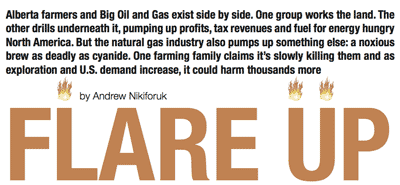
“Sour gas is one of the most dangerous, toxic substances known to man,” he said. “Having a sour gas well 800 metres from your home is like having a child molester an in urban community. You never know when things are going to go wrong.”
Charlie Smith. "Andrew Nikiforuk: EnCana pipeline attacks are not ecoterrorism." Straight.com. 2008-10-17.
You can read another interview with Nikiforuk about his Tyee project here and find his work, so far, here.
See: The Globe and Mail. "Andrew Nikiforuk wins Rachel Carson medal." July 22, 2009.
See: Society of Environmental Journalists.SEJ's Rachel Carson Environment Book Award."
Read the results.
Here's why they did the survey.
There are probably no more important reforms to government than the ones that came with the passing of the Federal Freedom of Information ("FOI") Act. The law recognized in no uncertain terms that if government is to be of the people, by the people and for the people, the decisions and actions of the government must be open for review by the people.
The states, for the most part, followed the federal government in adopting open records laws.
Unfortunately, state FOI laws have proven to be almost uniformly weak and easy to undermine. The weakness and haphazard construction of the state laws has resulted in an information gap that significantly effects the citizenry's ability to examine even the most fundamental actions of government.
| BGA survey of FOI laws |
In the course of numerous investigations, Better Government Association investigators have been refused in our requests to review state contracts and performance measures, denied everything from documentation of ambulance response times to the documents reviewed when making budgeting decisions, and ignored by officials in nearly every major office at one time or another. Our experience told us that the FOI laws simply do not work very well in Illinois.
As a result of our hands-on experience with Illinois' lack of responsiveness, the BGA decided to find out where we stood in relationship to other states. We found that no one had completed any sort of national analysis of FOI laws, and that Illinois' relative strengths and weaknesses could not be measured without creating a new instrument to study the problem and without an analysis of each state's statutory provisions for FOI.
I was looking for the original article and ran this search on Google Scholar.
Analysis conducted by the Better Government Association
Staff: Terrance A. Norton, James M. Newcomb & Jay E. Stewart
Interns: Erika Washington and David Hall
Alabama, Alaska, Arizona, Pennyslvania, Montana, South Dakota, Tennessee, and Wyoming all got a bit fat F.
Powder River region of northern Wyoming.
See: SkyTruth: Upper Green River Valley - A View From Above
Every day millions of gallons of clean ground water in the American West are being contaminated, all in the rush to drill for gas.
BILL WEST: It took thousands of years to recharge these aquifers.
They're pumping it out and in maybe ten years it will be gone...






